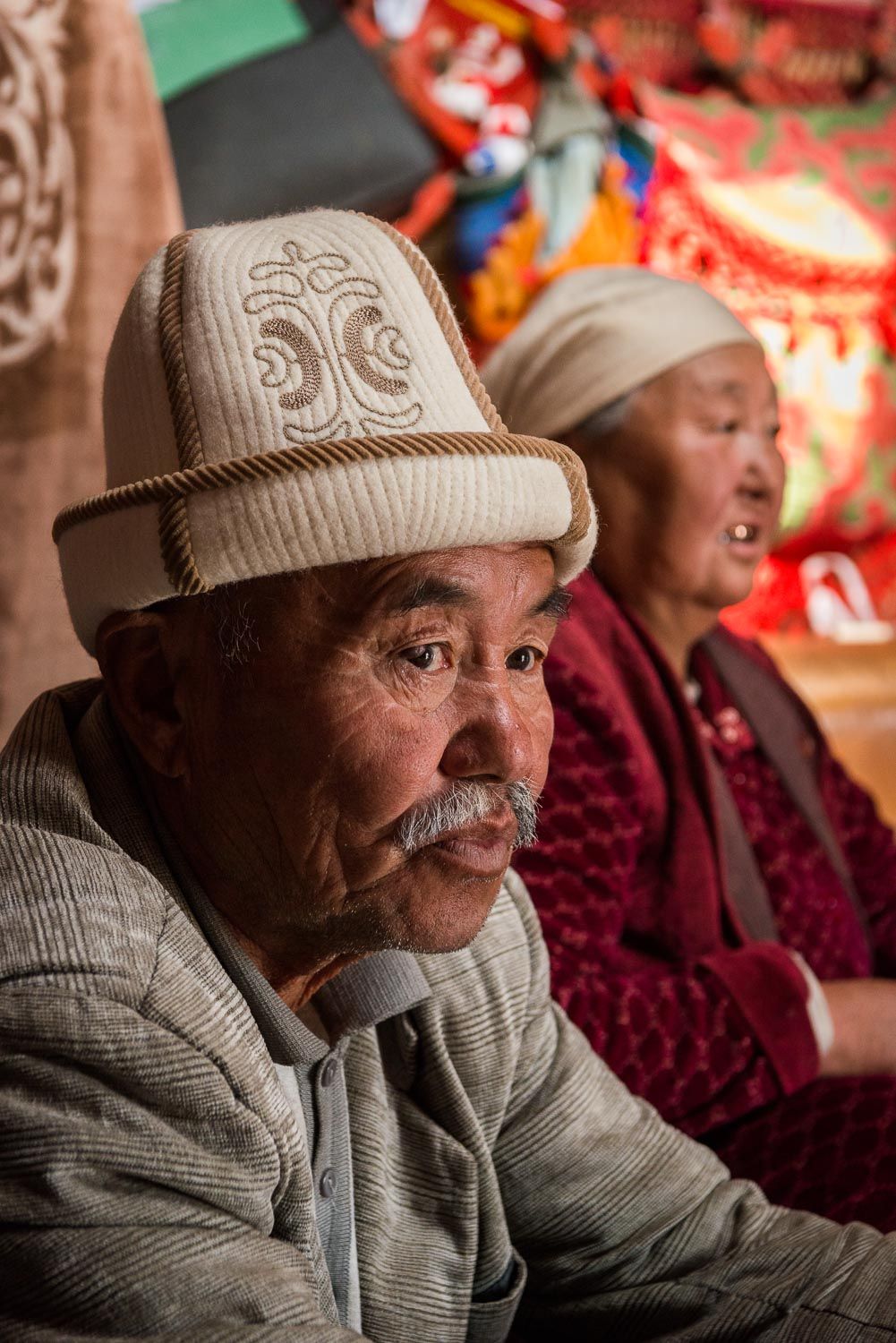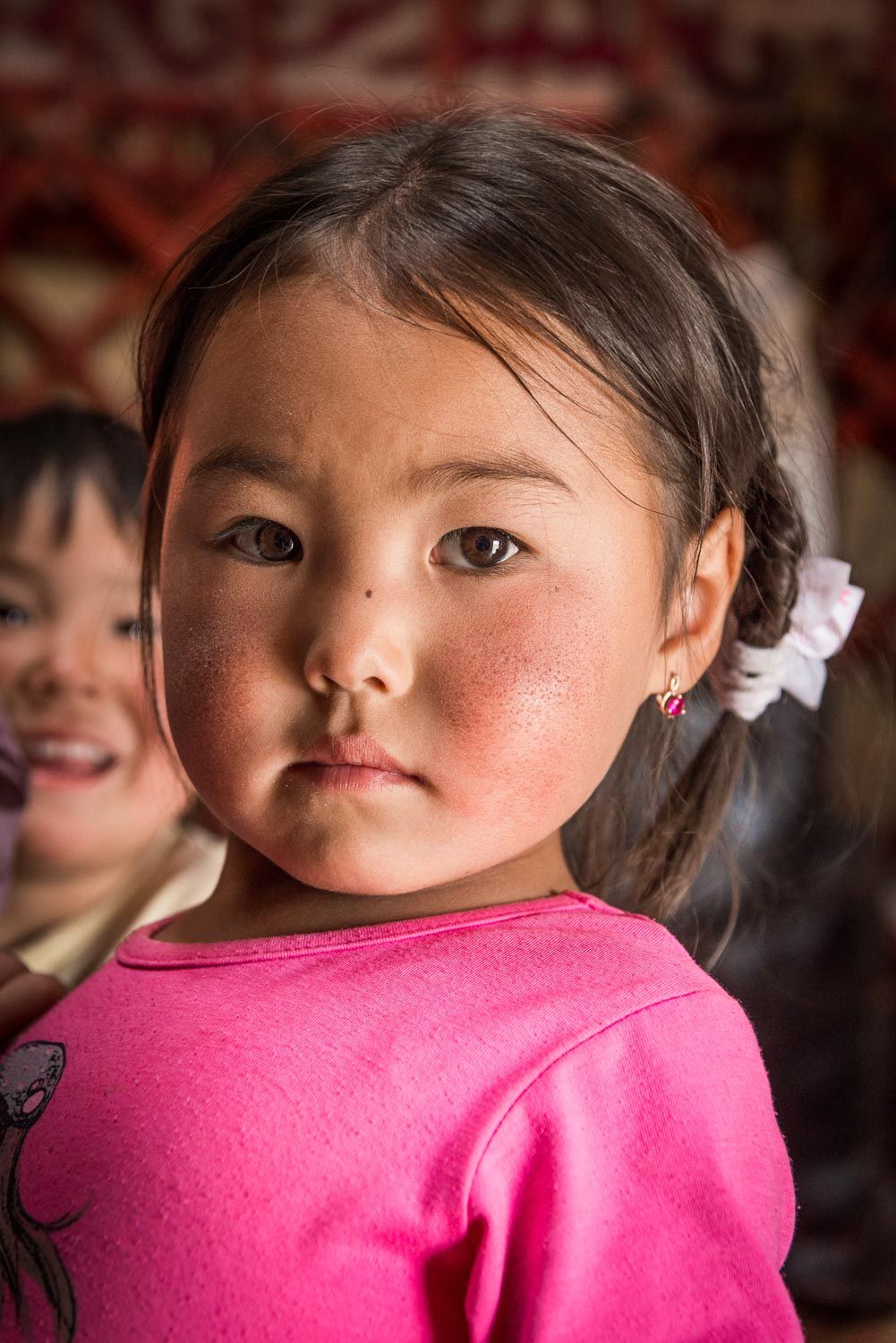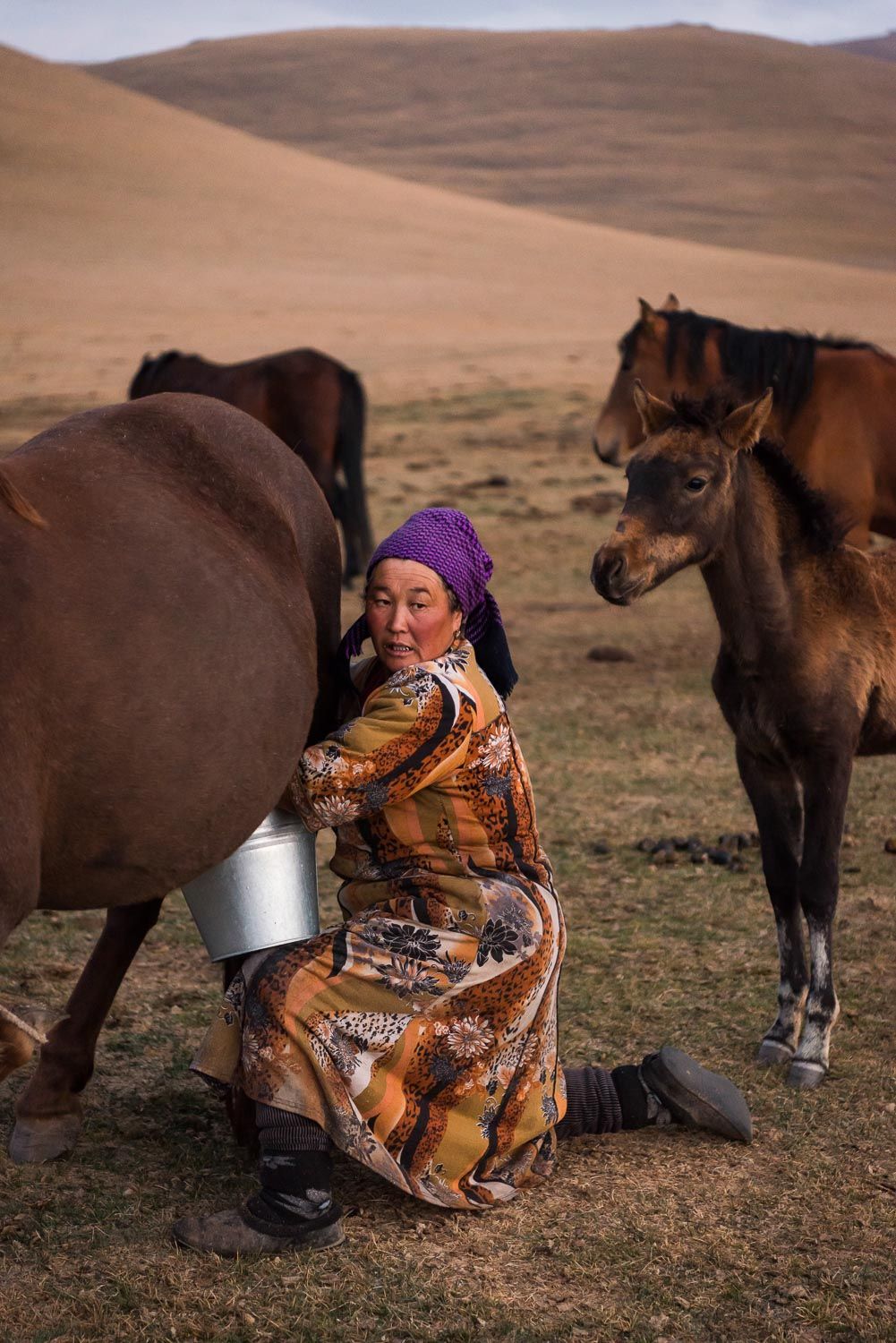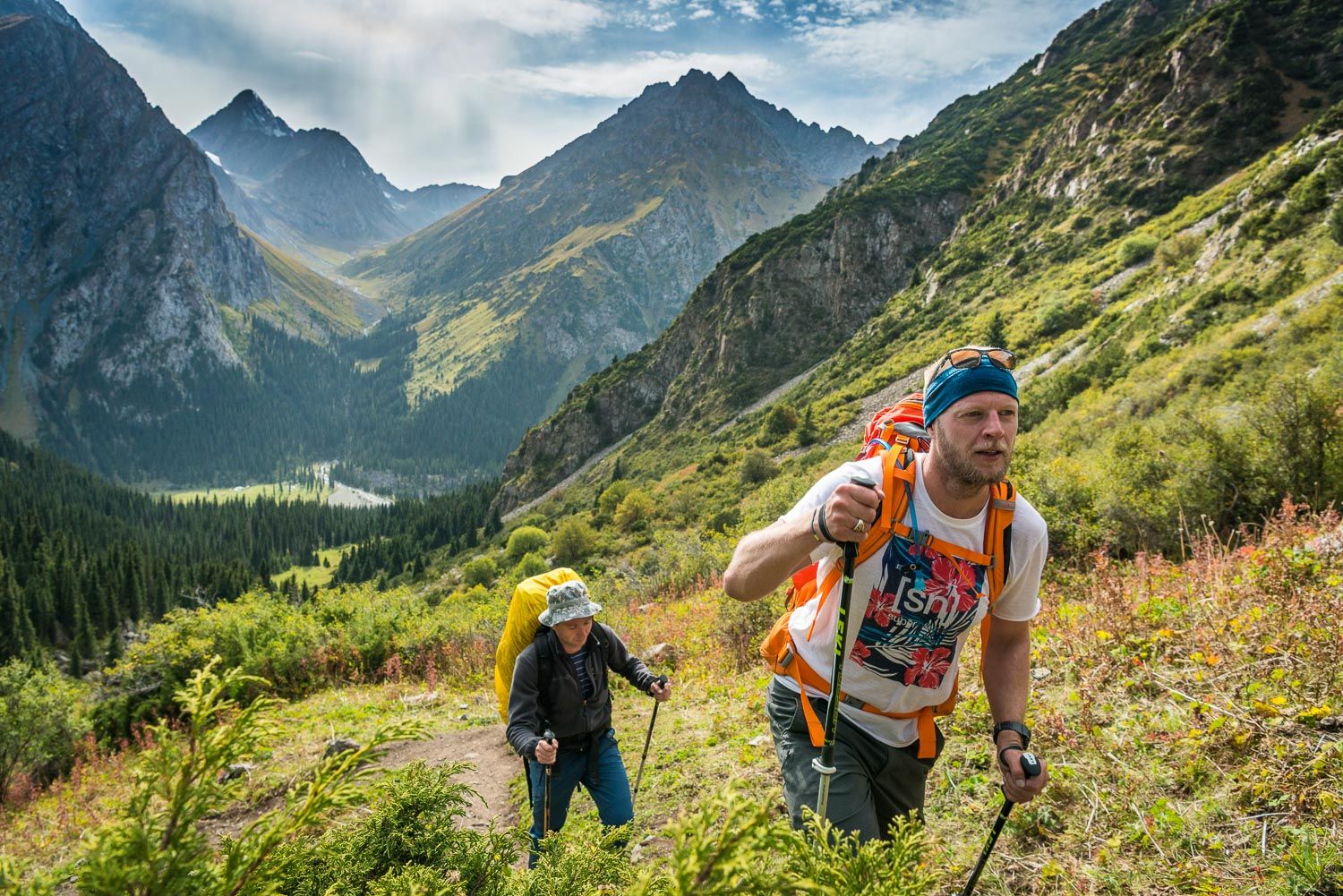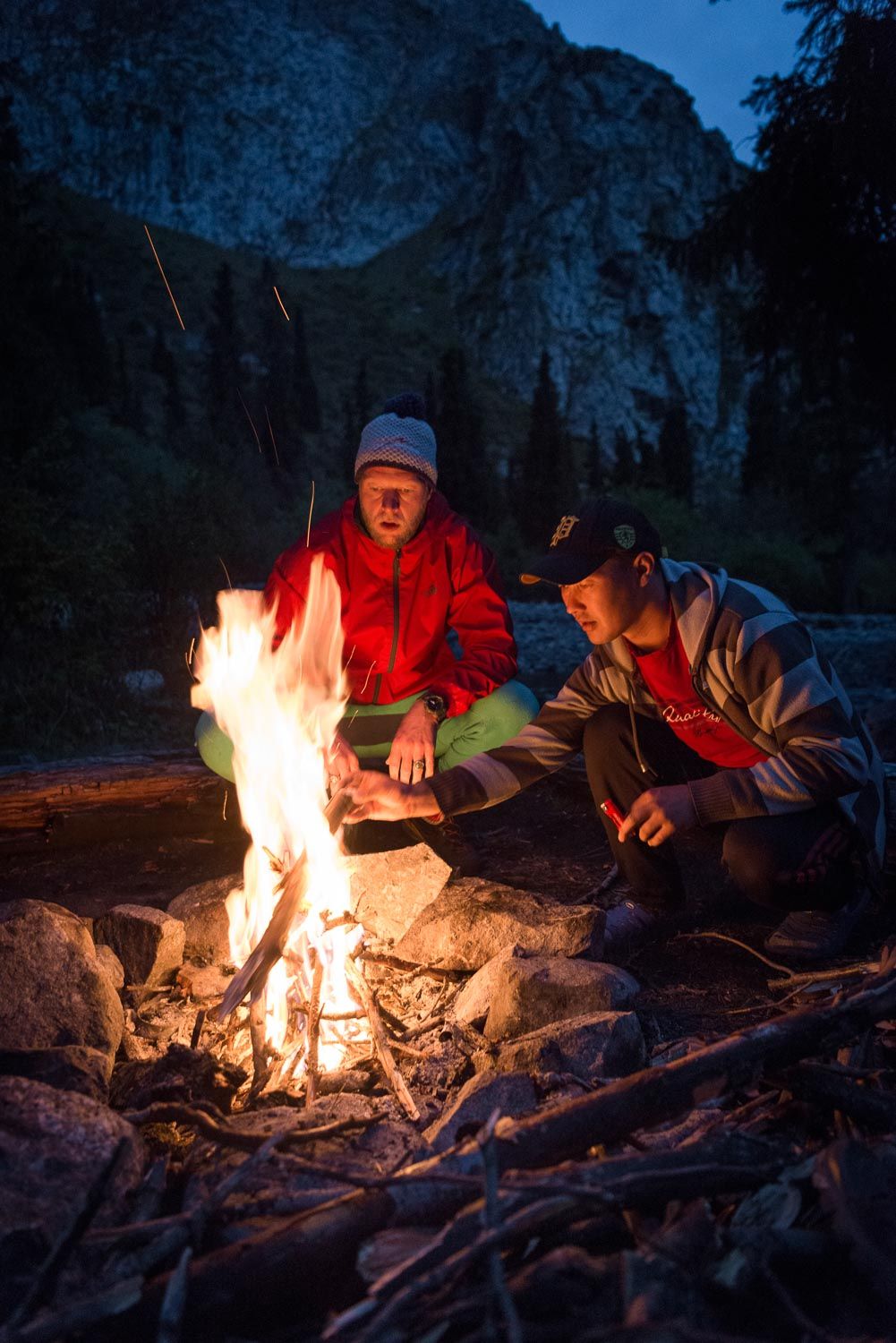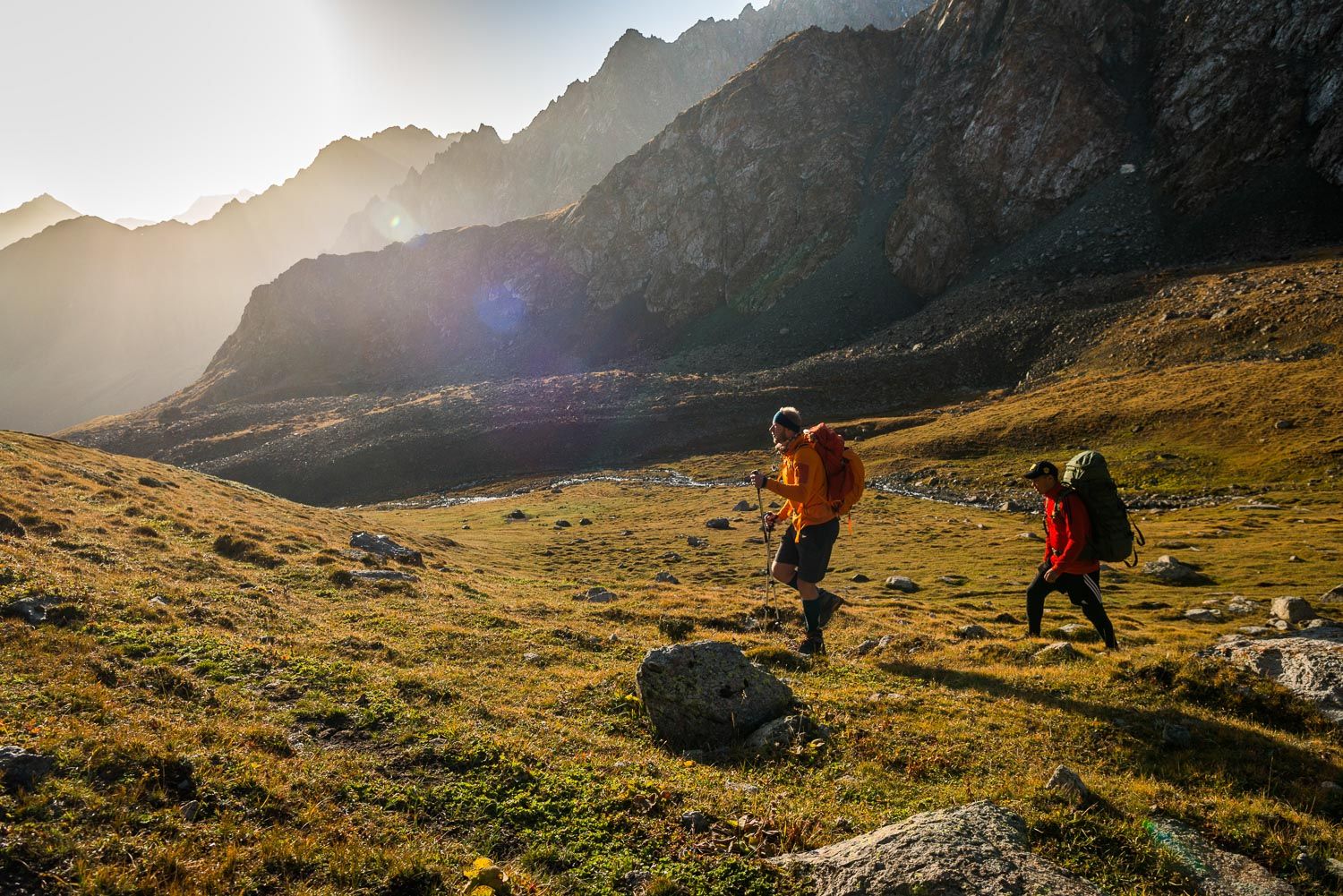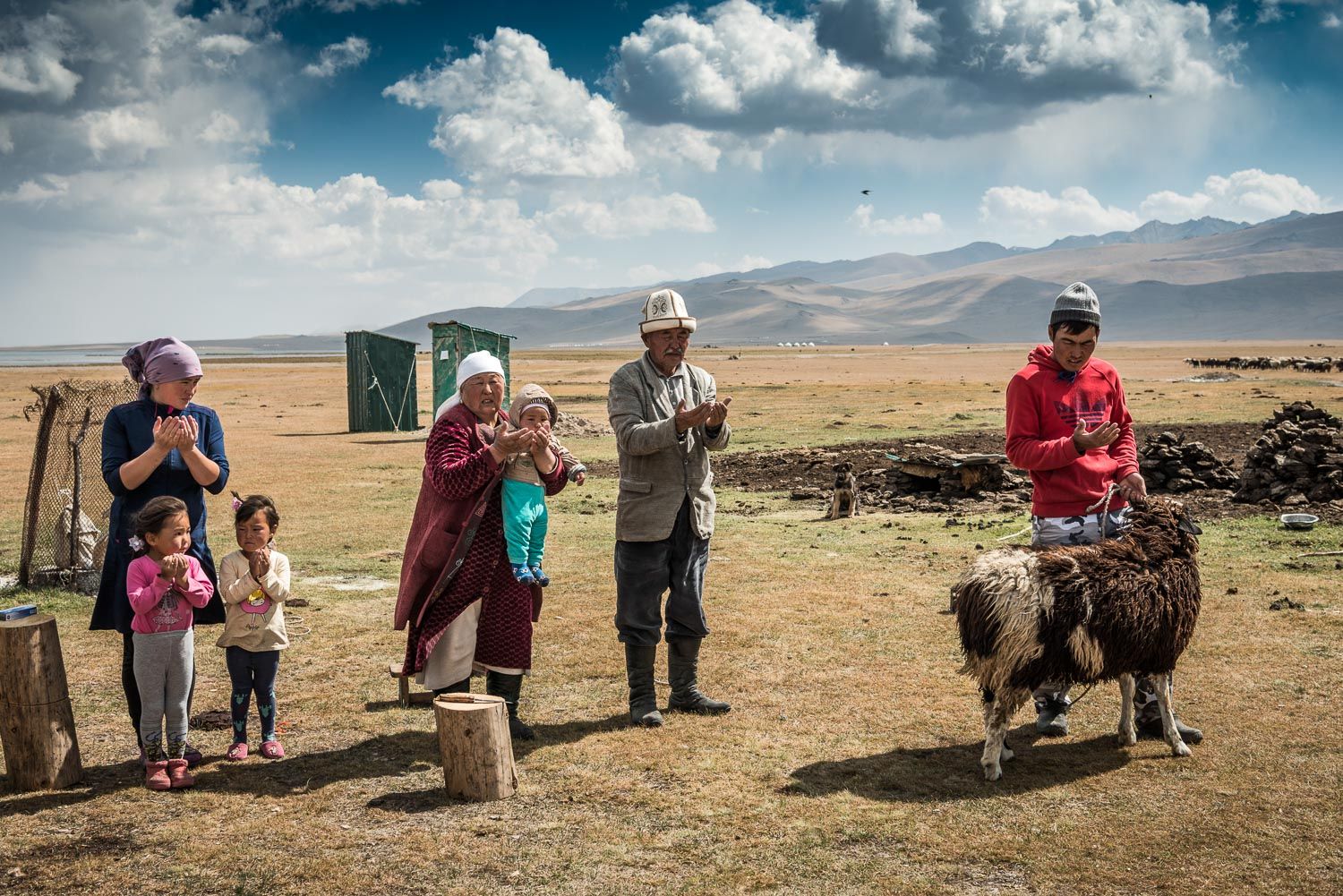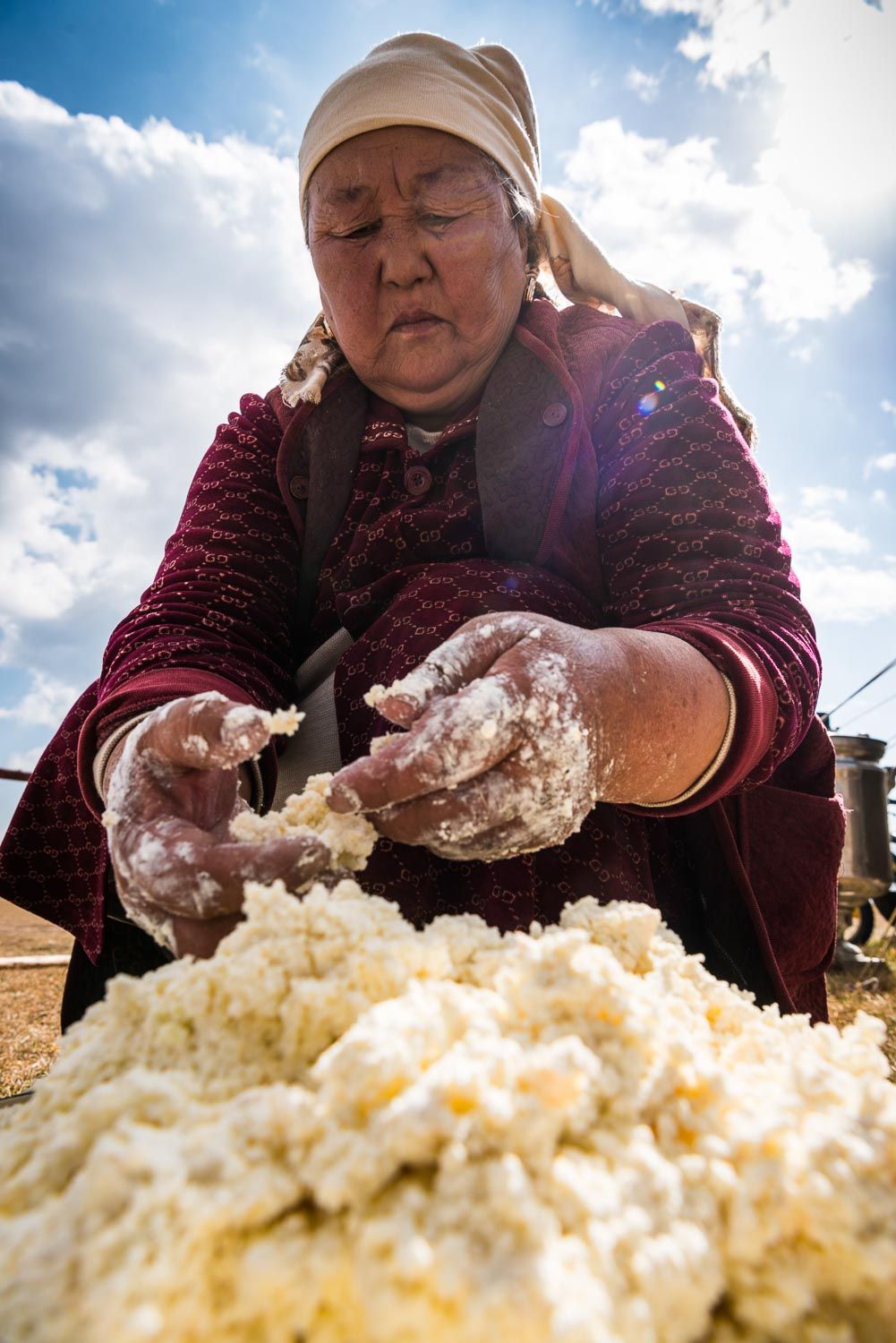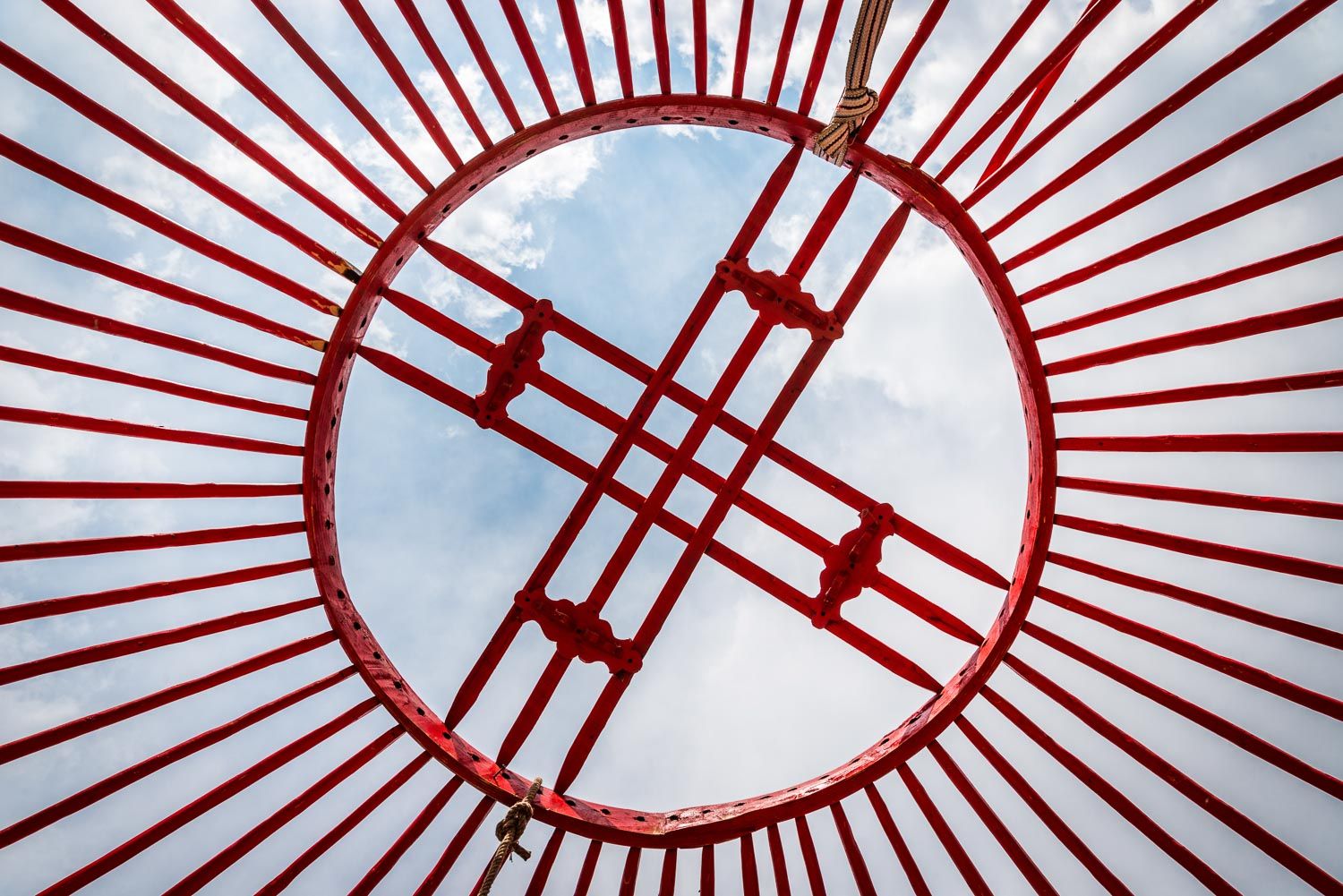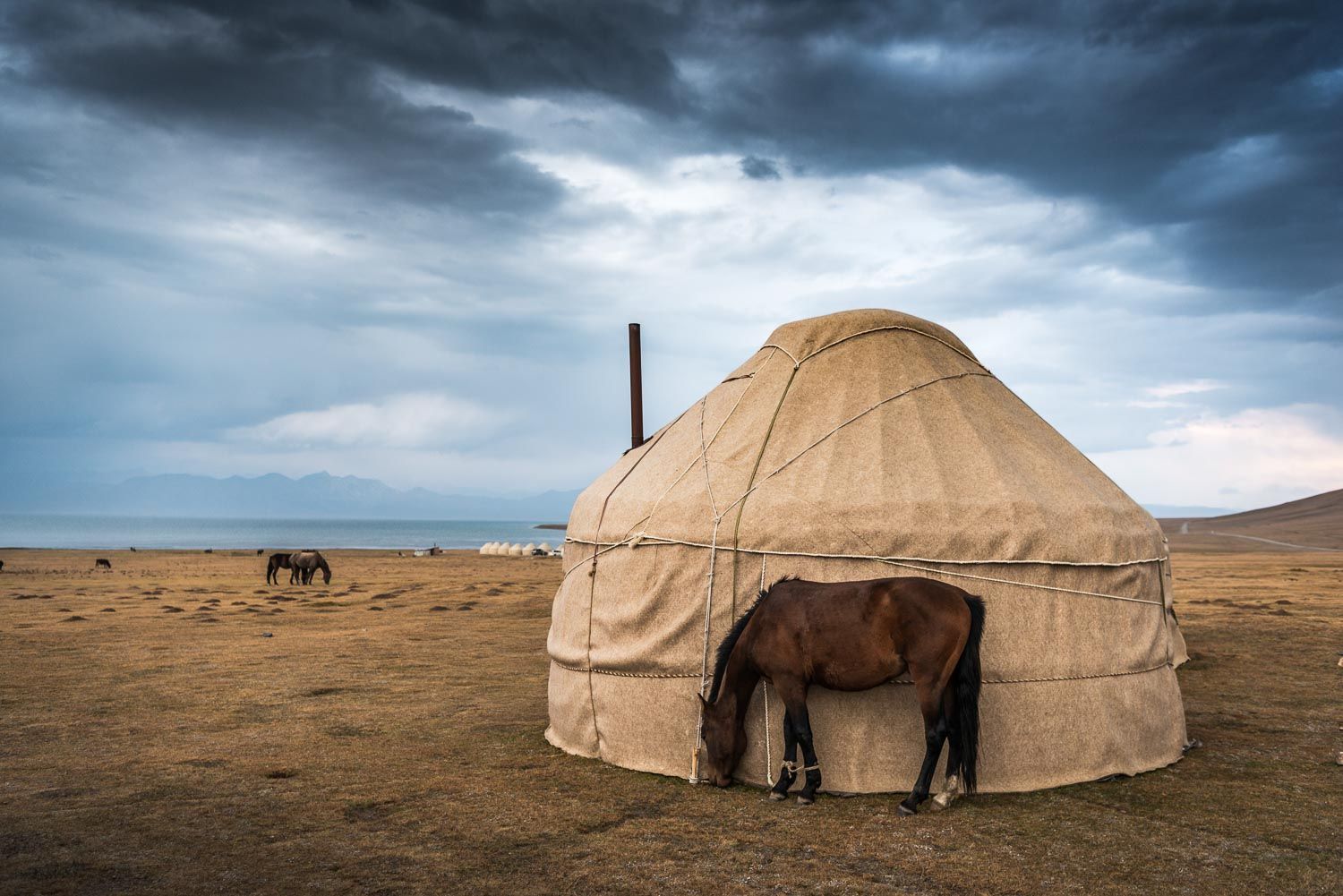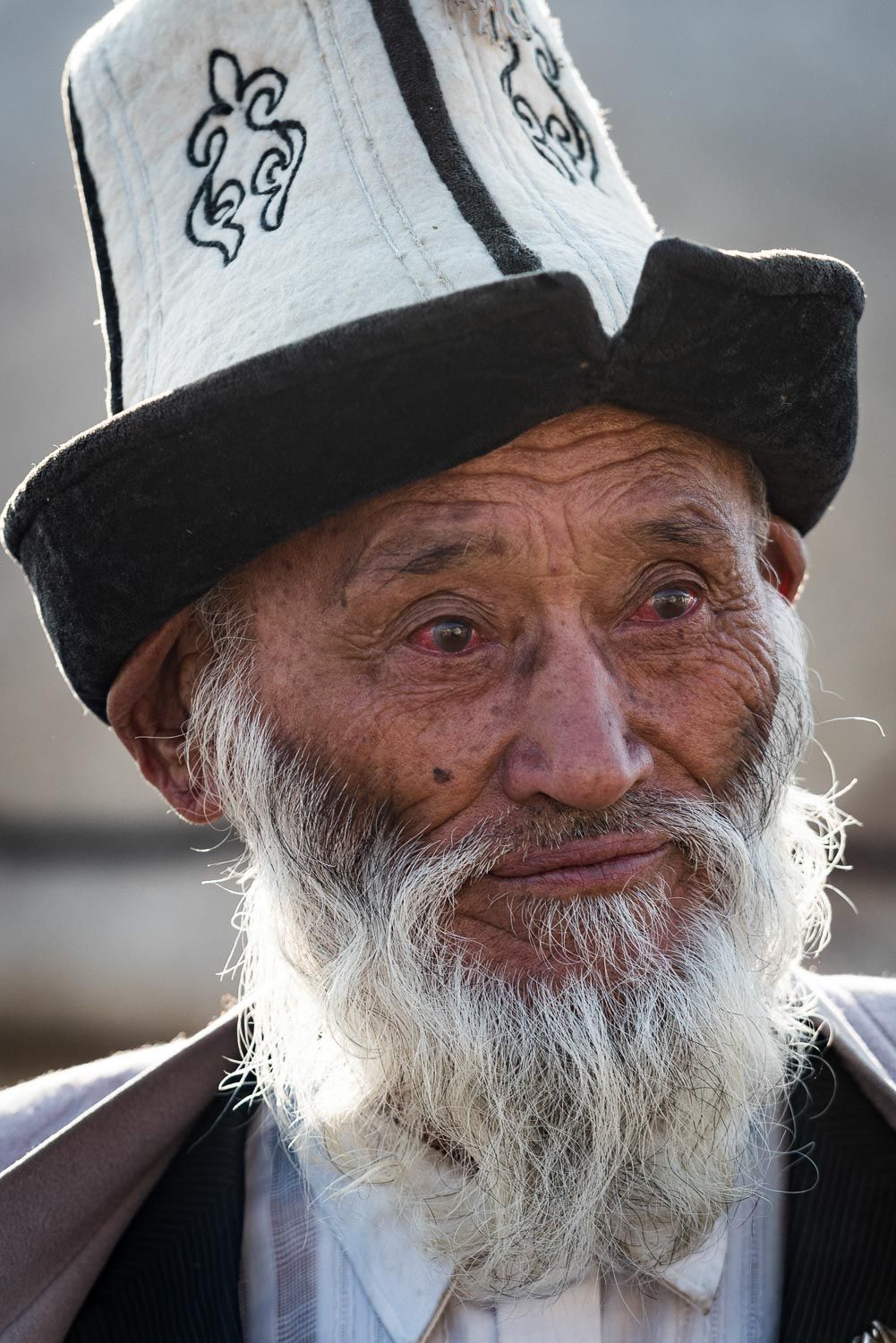The silence and storm of the Tien Shan
Kyrgyzstan
Sunday morning, Soň-Köl Lake. Or would it be Monday morning? Above, a lonely deck of clouds moves over the plane. That’s the only sign the world is still moving. As far as I can see; mountaintops on both sides, sometimes sharp, sometimes smooth as satin, in between the kilometers-long mountain lake surrounded by ankle deep grass. A landscape so wild, ferocious, isolated, and dramatic, I don’t even realize I am humming Ennio Morricone’s The Good, the Bad and the Ugly.
In this all-encompassing nothingness, we find the yurt camp, belonging to Akyl and his family. Akyl, 31, his wife Nargiza, 27, their daughters Janyl Myrza and Cholponai, 5 and 3, grandpa and grandma Mamytbek and Tinatin, retired, and the nine-month-old Ali. Furthermore five yurts in a straight line, a fence for the sheep, a tap fabricated out of a bucket on a pole, a doghouse made from cow manure, and close to that an outdoor toilet. And, not insignificant: 350 sheep, 70 horses, 25 cows, 20 yaks, and the dogs Sherhan, Jesbilek, Sharik, and Laika.

‘Would you join us for breakfast?’ Nargiza asks when I look around the corner of the family yurt. The colorful felt cloths that clad the inside of the round tent turn the interior orangy-pink, as though I’m looking into a box made from paper maché. Together with guide Vlad and driver Ilya, both ethnic Russians, photographer Frits Meyst and I take a seat at the low table, against a bulkhead behind which the matrasses are piled up. Grandpa gives us a modest nod, almost expressionless, and Janyl Myrza and Cholponai, who never miss an opportunity to climb over grandpa’s round belly, give us a curious glance.
It is the day’s first family moment. This morning, the horses were milked, the bedroom was transformed into a living room, Nargiza baked bread, grandma boiled water and grandpa has taken the clip of the sheep fence. And I saw him sharpen a knife as well.
We shared the green banks with grazing horses that bristled with happiness
BLIND SPOT ON THE WORLD MAP
It feels like it was weeks ago, that we were trekking with a tent and food supplies through the Tian shan. A gigantic mountain range stretching over Kazakhstan, China, Uzbekistan, and Kyrgyzstan which the nomads call home. In the eastern Karakol valley, we followed the Karakol river upstream, through a landscape that belongs in a still-life painting. The river seemed to flow straight from the sky through the mountaintops, after which it rolled in various streams through a pine forest past our feet. We shared the green riverbeds with grazing horses snorting out of pure happiness. Just like us.

A man crosses a clear mountain river near Altyn Arashan
‘The trail to Altyn Arashan is one of the most beautiful routes in Tianshan,’ Vlad said when we crossed the Karakol river on a small bridge made out of tree trunks into the forest. ‘The various landscapes follow in quick succession and just below the top there’s a glacier lake that changes color depending on the weather.’ Vlad knows Tian Shan like the back of his hand. For years, he explored the mountain range on foot and after constantly giving tips to friends, he decided to make it his job. ‘New routes are mapped out all the time. And that’s a good thing since ever more tourists want to see the beauty of our mountainous landscape with their own eyes.’
Since the abolition of visas in the summer of 2012, Kyrgyzstan’s popularity has risen considerably. Adored by nature lovers and treasured by adventure hunters

Experience Kyrgyz Hospitality
UNLEASH YOUR NOMADIC SPIRIT
Guided by principles of ecotourism and fair trade, Baibol team works since 2016 with the aim to provide international travellers with unique access to Kyrgyzstan’s spectacular nature and ancient nomadic traditions. Horseback riding, hunting with golden eagles, mountain trekking, and off-road jeep tours are only a hint on the countless activities awaiting you to enjoy the stunning views and beautifully crisp air of the country. Unleash your nomadic spirit as you get close to the freedom-loving culture of Kyrgyz people and their proud heritage of nomadic civilization.
QUENCH YOUR THIRST FOR ADVENTURE
Feel Nomad is a collective of top-skilled travel experts united by the same passion: to guide you off the beaten paths and let you discover Kyrgyzstan and its thriving multiethnic society through the eyes of locals. Snow lovers can look up for the adventure of a lifetime on the country’s untouched slopes though horse back-country skiing, freeriding and cultural winter tours. In summer, a variety of other activities like biking, jeep excursions, adventure and cultural tours will quench the thirst of any intrepid explorer.
Akyl says his prayers before slaughtering the sheep which feeds his family
Grandma Tinatin makes Kurut, little balls out of the fresh yoghurt, that are dried and taste salty.
FOR RENT: SIMPLE YURT
In Akyl’s camp, everything goes a lot smoother. Except for a sheep, who realizes he only has a few moments to live. Grandpa hands Akyl the knife he sharpened this morning, and the children walk back and forth with bowls for the meat. When the family has thanked Allah for his providence, Akyl puts the knife into the sheep and fillets the animal in less than half an hour into bite-sized pieces—for two days of breakfast, dinner, and lunch—until there is little more left than a shining, shaking skin on the clothesline. And an empty can of blood, devoured by the dogs.
I admire everything. Maybe you need nomad genes to survive here. For Akyl and his family, and the nomads that have inhabited the jailoos (alpine pastures) since the beginning of times, this seems like child’s play, for me it seems like an impossible assignment. A life between rock formations and snowy summits, flogged by the weather, with peaks reaching high into the sky, a life that is shared with wolves, lynxes, bears, and snow leopards, filleting your own sheep? I wouldn’t know where to start.
Akyl puts the knife into the sheep and fillets the animal in less than half an hour into bite-sized pieces— for two days of breakfast, diner, and lunch—
Ilya nods in understanding. ‘But they have thousands of years of experience. Only during the Soviet Union, when shepherds had to hand over their life stock and work in state factories.’ A razor-sharp wind blows on the foot of the Khrebet Bauralbas. Ilya, whose grandparents once met in a kolkhoz, pulls his hood over his head. ‘Since the independence in 1991, the nomad culture has slowly started to flourish again. From abroad there is an increased interest, with the bi-annual World Nomad Games, a kind of Olympics for Central-Asian nomad sports, as a public attraction.
Akyl too has found a way to make his life a little easier. He has been renting out a yurt to travelers for two years now. A simple tent with beds, a stove, and a fur coat as decoration. There is no running water, nor a tv, telephone or internet connection. But the only thing that is really important: It is a unique chance to take a look into the daily lives of a nomad family. Friendships are made instantly here. Janyl Myrza and Cholponai enthusiastically demonstrate how they can make their air-filled cheeks explode and when passing the doghouse Laika, the shepherd dog puppy, doesn’t miss an opportunity to play.

That afternoon, Vlad wants to try and make a phone call anyway. A few kilometers away, there is a black rock that sometimes gives a connection because of the reflection of an antenna. There is a manual though: only the big providers, and only an old phone. Amused, Ilya, Frits and I watch from the car how Vlad walks around the stone with a phone he borrowed from a neighboring shepherd. Then his arm rises, he climbs onto the stone, walks up the mountain shaking his head, walks down again, and steps into the car, not having succeeded. The tenor is clear: you don’t want to have a break down with your car around here.
The sky turned into a Tesla ball, and phones, walking sticks and haircuts buzzed, shocked and shot up. The Tian Shan seemed to be screaming: You are no longer welcome!
FIGHTING WITH THE TIAN SHAN
During our trip through the Tian Shan, we had left our campsite and climbed to Ala-Köl in two hours. The sun shone strongly and the trail running over pointy rocks went straight up. But Vlad was right. Once at the top, we had the view of a breathtakingly beautiful glacier lake, that lay at our feet like a bathtub full of bright green Kneipp-water.
On the road, walking over the edge of the bathtub towards the top, we were chased by thunder clouds, thick as used coffee filters. No time to shoot a panoramic picture. The sky changed into a Tesla ball and within no time phones, walking sticks, and hairdo’s zoomed, shocked, and shot up. The Tian Shan seemed to shout: You’re no longer welcome. And we were leaving the pass a fast as as we were in dropping our stuff when we got there.
Hail, wind, snow, and thunder clouds took away all visibility of the valley. The way down was steep, zigzagging. To prevent the debris from sliding over the sides, I placed my feet with surgical precision. Cold wet snow stuck to my face and hands, in a landscape turning white in a hurry. Eventually the storm subsided and we set up camp in a grassy patch.

The next morning, I washed my face in the river. On the side, between the stones, little membranes of ice shivered, vulnerable like layers of crème brulée. Everything was calm again. From behind the mountain, the morning sun lit up our path, that led us over marshy grass slopes, through shadowy forests, deeper into the Keldike Gorge, past round, yellowish wear spots that gave away the fact the nomads had recently left their summer camps. In an abandoned hut with views of the last kilometers of the expedition, we made breakfast.
At base camp, we could finally take off our hiking shoes—one of the most satisfying mountain climbing experiences—and an old key gave access to a shed of which the floor was dug-out and enforced with concrete. The reward for three heavy days in the Tian Shan was the Altyn Arashan hot springs, a simple stone tub with hot, healing water from the earth’s crust. I couldn’t care less about the rest of the world at that moment.

PLAY TIME IN SON KÖL
Sunday afternoon, lake of Soň-Köl. Or was it Monday afternoon? Caramel-brown dust clouds appear on the horizon. Smokescreens, in tiny tufts, out of which we see dozens of horses galloping only a few moments later. It is five o’clock in the afternoon and the neighboring guys—read: shepherds living on the plateau, sometimes kilometers apart—come out to play.
A game of kok boru, ‘dead-goat-polo’, starts when one of the riders pulls a goat carcass from the back of an old Audi. At the foot of the hill, the men shoot back and forth between the two round plateaus that serve as goals. Again, an impenetrable dust cloud forms in which the players, in an attempt to take the dead goat from one another, have their horses run into each other. Dull blows fill the ever quiet valley, from muscled chest to muscled chest, only to be interrupted by fiery cowboy cries. It’s a fierce game and the men show themselves to be amazing riders. They go from hanging sideways from their horse to grab the carcass from the ground, the reins between their teeth, to finding a spot in between the chaos of horses and starting an unparalleled sprint.
Caramel brown dust clouds appear on the horizon, from which a dozen horses gallop a short time later
Back in camp, Nargiza too prepares for winter. The first yurts have been taken down already, and in the upcoming days, she will make a stock of kumis, fermented horse milk, for the winter. In two weeks, Nargiza, grandpa, grandma, and the kids will be picked up by a truck, Akyl follows on horseback. In a day and a half, he will lead his lifestock safely over the passes, spending the night in a cave. I ask if she looks forward to going home. Nargiza shakes her head. She would prefer to stay on the calm jailoo a little longer.
Our return trip awaits as well. We entertain ourselves a little longer with the view through the square opening of the tourist yurt. On the horizon, we see a rider or on horseback become smaller, and in the air, an eagle glides on thermals. Grandpa plods, bent over, on the plain to collect cow dung for the stove and Akyl peeks in to tell me I slept with my feet towards Mecca last night. And when Janyl Myrza and Cholponai march through the square hole too, from left to right, repeatedly, followed by dogs, we come to the conclusion you don’t need a television here.
Things to see & do in Kyrgyzstan








